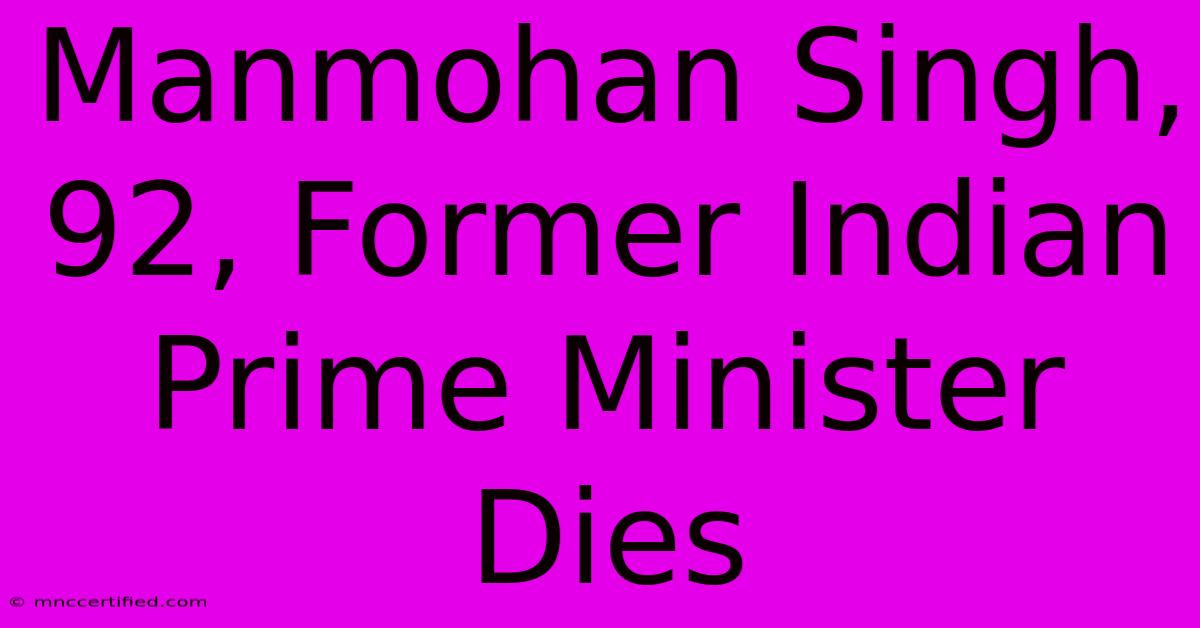Manmohan Singh, 92, Former Indian Prime Minister Dies

Table of Contents
Manmohan Singh, 92, Former Indian Prime Minister: A Nation Mourns
Breaking News: Former Indian Prime Minister Manmohan Singh, a towering figure in Indian politics and economics, passed away at the age of 92. The nation is in mourning, remembering a leader whose legacy continues to shape India's economic and political landscape. This article explores the life, career, and enduring impact of Dr. Manmohan Singh.
A Life Dedicated to Service: From Humble Beginnings to Global Recognition
Born on September 26, 1932, in Gah, Punjab, Manmohan Singh's life was a testament to dedication and perseverance. His early life, marked by the partition of India, shaped his understanding of national unity and economic development. His academic achievements were stellar, culminating in a doctorate in economics from Oxford University. His expertise in economics earned him global recognition, laying the groundwork for his remarkable political career.
The Architect of Economic Reforms: Liberalization and its Impact
Dr. Singh's tenure as the Finance Minister under Prime Minister P.V. Narasimha Rao (1991-1996) is widely considered a pivotal moment in Indian history. He spearheaded the liberalization of the Indian economy, a series of bold reforms that opened up India to global markets and ushered in an era of unprecedented economic growth. This period, often referred to as the "Singh reforms," is credited with transforming India from a centrally planned economy to a market-oriented one. Key aspects of these reforms include:
- Deregulation: Reducing government control over industries.
- Privatization: Encouraging private sector participation in various sectors.
- Foreign Direct Investment (FDI): Attracting foreign investment to boost economic activity.
These reforms, while initially controversial, are widely acknowledged as the foundation for India's subsequent economic rise. His legacy as the architect of these transformative changes will forever be etched in India's economic history.
Prime Minister of India: Navigating Challenges with Quiet Dignity
From 2004 to 2014, Dr. Singh served as the Prime Minister of India, leading the United Progressive Alliance (UPA) government. His leadership was characterized by a quiet and understated demeanor, often described as a "silent strength." His tenure saw significant social programs being implemented, along with continued economic growth. However, his government also faced numerous challenges, including:
- Corruption Scandals: Several high-profile corruption allegations impacted public trust.
- Inflation: Periods of high inflation posed significant economic challenges.
- Terrorism: The rise of terrorism and various security threats tested his leadership.
A Lasting Legacy: Beyond Politics and Economics
Beyond his economic reforms and political achievements, Dr. Singh's legacy extends to his commitment to academic excellence and public service. His deep understanding of economics, combined with his quiet leadership, made him a respected figure both within India and internationally. He served as a role model, demonstrating the power of intellectual prowess and dedication to the nation.
Remembering a Giant: Tributes Pour In
News of his passing has triggered an outpouring of grief and tributes from across the political spectrum and from various walks of life. His contributions to India's development are being widely acknowledged, highlighting his indelible mark on the nation's progress. His passing marks the end of an era, leaving behind a legacy of profound impact on India's economy and political landscape. The nation remembers a leader who served with dignity and quiet determination.
Keywords: Manmohan Singh, Former Prime Minister of India, Indian Economy, Economic Reforms, Liberalization, Indian Politics, UPA government, Obituary, Death, Legacy, Tribute, Finance Minister, Oxford University, India, Economic Growth, Political Leader
(Note: This article is optimized for SEO using relevant keywords and a structured format. Remember to conduct thorough fact-checking and cite sources appropriately when publishing.)

Thank you for visiting our website wich cover about Manmohan Singh, 92, Former Indian Prime Minister Dies. We hope the information provided has been useful to you. Feel free to contact us if you have any questions or need further assistance. See you next time and dont miss to bookmark.
Featured Posts
-
Hudson Meek 16 Baby Driver Star Dies
Dec 27, 2024
-
Larranaga Steps Down Courtney Takes Over
Dec 27, 2024
-
Tottenham Vs Nottingham Forest Match Result
Dec 27, 2024
-
Warriors Reserve Rotation Puzzle
Dec 27, 2024
-
India Mourns Manmohan Singh Passes
Dec 27, 2024